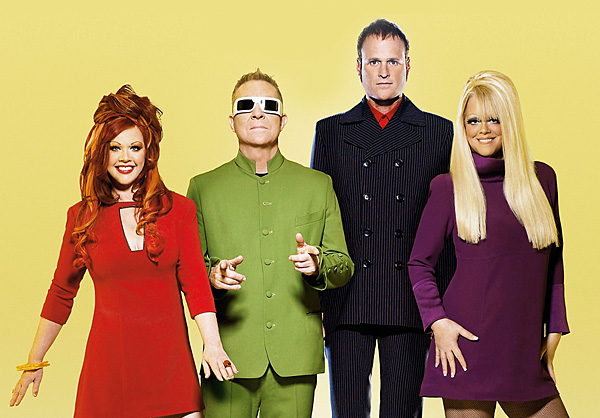The B-52's: The B-52's Page 2
No Band Is An Island
'Rock Lobster' became The B-52's debut single in April 1978 (and was later reissued in edited form after they signed to Warner Brothers), and following an appearance on US television institution Saturday Night Live the song became their debut hit. The group also found favour in the UK, with their first shows in London attracting fans as diverse as Scritti Politti's Green Gartside, Joe Jackson and Sandie Shaw.
To record their self-titled album, the group were flown to Compass Point studios in the Bahamas, with Island Records supremo Chris Blackwell at the controls. 'Chris was Mr Cool, very English', Strickland told MTV. 'It wasn't really clicking and he said, let's take a ride on my boat, so he takes us out on this boat to this little beach.'
Happy Planet
'Peter Frampton was hanging out', said Cindy Wilson. 'It was an amazing adventure. I was 17/18 when we started, [so] I was like, oh my God! The most exciting time, meeting all these incredible people.'

While recording in the Bahamas, The B-52's fine-tuned more trademark hits, such as the album's opening track and their second major hit single, 'Planet Claire', a kitschy sci-fi banger based around a repurposing of Duane Eddy's twanging guitar riff from 'Theme From Peter Gunn'.
It's an instrumental piece for the first two and a half minutes – hard to imagine any single being written that way these days – before Schneider's curious vision of an alternative universe takes shape. 'Planet Claire has pink air/All the trees are red/No one ever dies there/No one has a head.' We'll take your word for it, Fred.
B-movie touches were added by Keith Strickland to offset Ricky Wilson's Eddy-esque riff, Pierson later told AV Club. 'Keith wanted to come up with a more formalised melody, so he came up with that sort of Fellini-esque, Nino Rota-inspired melody line on the keyboard.'
Cover Story
The humour of the band's approach is ever-present on the album, without descending into parody. '52 Girls' manages to make a lyric out of listing girls' names, and 'Dance This Mess Around' urges us to perform dances which would, on further inspection, turn out to be figments of the band's imagination. We're still waiting to see the Shy Tuna, the Camel Walk and the Hip-O-Crit performed in all their glory.
Meanwhile, Ricky Wilson had turned an early limitation of his guitar playing into a strength. 'The G string was missing off the guitar so there was a gap', Strickland remembered. 'The B and E strings were tuned in unison and he started doing this thing where he would play a lead line with those two strings and the other strings would be this open chord, and he kind of did this alternating thing… I'd never heard anything like that. [It] sounds like two guitars playing at once.'
As well as the eight original tracks included on the album, the band also threw in a typically unorthodox cover version, which nearly landed them in hot water. 'We did a wacked-out version of [Petula Clark's] "Downtown" and Tony Hatch [who wrote it] was going to sue us, but Chris Blackwell knew him and told him "Don't worry, you'll see, you'll be really happy…"'

The B-52's remains arguably the band's defining statement, although not everyone was convinced by its merits at the time. 'Even the cover was iconic'. Pierson told MTV. 'The picture was taken by George Dubose, but the art director who made the sleeve out of it [Tony Wright, responsible for other sleeves including Bob Marley's Natty Dread and Steve Winwood's Arc Of A Diver] called himself Sue Absurd, because he didn't want to own up to doing this kooky cover.'
Artwork aside, the impact of the LP was considerable, as it eventually went platinum in the US, as well as gaining a significant audience in the UK among fans for whom The B-52's were a welcome day-glo antidote to the wilfully monochrome aesthetic of much of the British post-punk scene.
Beatle Mania
Among those inspired was John Lennon, who heard a kinship between these newcomers and their anarchic brand of pop and his wife's avant-garde oeuvre. The former Beatle found himself motivated to return to the studio. 'It sounds just like Ono's music', he said of hearing 'Rock Lobster' on the radio. 'So I said to meself, "it's time to get out the old axe and wake the wife up!"'
Lennon might not have had much longer to make music himself, but over 40 years on, The B-52's joyous musical accident is still firing up new listeners.










































